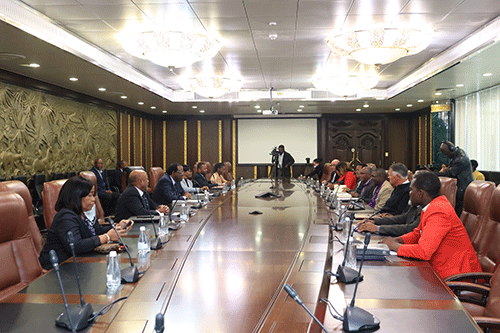As Namibia’s urban population is expected to increase from 52% to 60% by 2030, the country’s demand for formal housing is increasing with urbanisation and offers a key economic opportunity.
The country is experiencing annual urbanisation of around 3.8%, translating to 50 000 people or 13 500 new urban households, annually. Namibia needs more than 30 000 housing units annually to fight the backlog the country is experiencing.
These was stated in the Namibia Country Private Sector Diagnostic (CPSD) launched by the World Bank last week. The CPSD’s objective is to identify near and medium-term reform opportunities to revitalise the private sector and help reposition Namibia’s growth on a green, resilient, and inclusive trajectory.
“Formal housing delivery is not keeping pace with demand, resulting in a rapid growth of informal settlements. The current need for about 45 000 new housing units per year offers a key economic opportunity,” reads the report.
It stated the housing sector creates spill overs across other sectors along the value chain, and thus has a high job-creating potential. Housing accounts for 10% to 30% of a country’s consumption, and 50% to 90% of household wealth and savings.
The high economic multiplier in the housing construction sector offers significant potential to support economic recovery by influencing demand for intermediate manufacturing and services inputs into the housing sector.
To clear the backlog of 300 000 houses over the next 10 years, more than 30 000 housing units are required per annum. One of the solutions presented is effective public private partnerships that can help re-build the local construction sector capacity and stimulate linkages with the manufacturing sector.
Namibia Housing Enterprise’s (NHE) spokesperson Tuafi Shafombabi said due to lack of serviced land and funding they only managed to provide 896 houses since 2016. NHE is publicly funded and its core business is providing housing to Namibia’s low-and middle-income earners and financing of housing for such inhabitants.
Another opportunity in the sector under review is the expansion of the national informal settlement upgrading support programme, which can increase private sector involvement in housing.
However, affordability of houses remains a thorn in the side of many would be homeowners.
According to the FNB Namibia residential property report for the first quarter of the year, by the end of March 2022, the average house in Namibia cost N$1.2 million.
The Shack Dwellers Federation of Namibia (SDFN) and Namibia Housing Action Group (NHAG) have built 6 865 brick houses in 2021.
The organisations drive the self-help construction of affordable housing units in 27 urban areas of Namibia and conduct informal settlement upgrading in 26 towns in Namibia.
Recommendations
Some of the short-term recommendations made by the World Bank is to support the finalisation and implementation of the housing strategy, drawing upon global experience, to promote sustainable urban development.
“Leverage lessons from the student village and Windhoek housing projects to refine the housing public private partnership framework, while also implementing digitalisation measures to improve cost and efficiency of the entire land delivery process, including land design, titling, approval, and registration,” recommended the bank.
In the medium to long-term recommendations, the report stated Namibia should create regulatory frameworks for the issuance of green housing finance. And, introduce innovative market-appropriate financial products for the low- and middle-income housing market.
Earlier this year, urban and rural development minister Erastus Uutoni said government and its partners are pursuing and implementing various impactful interventions and initiatives to scale up and accelerate access to tenure security, proper sanitation and housing.
Motivating his motion in the National Assembly in March this year to debate alternative housing financing schemes, Popular Democratic Movement (PDM) president McHenry Venaani described Namibia housing situation as distressing, specifically informal settlements that he said is “shocking”.
According to him, there are 285 informal settlements in towns across Namibia, meaning 40% of its urban inhabitants or 216 000 urban households are informally settled, which is indicative of the high urbanisation rates across the country.
Venaani believed the existing formal housing market does not readily cater to the majority of Namibians by virtue of their income level. According to him, this market failure is caused primarily by the limited availability of serviced land, thus severely constraining the ability of developers and others to construct houses.
mndjavera@nepc.com.na


